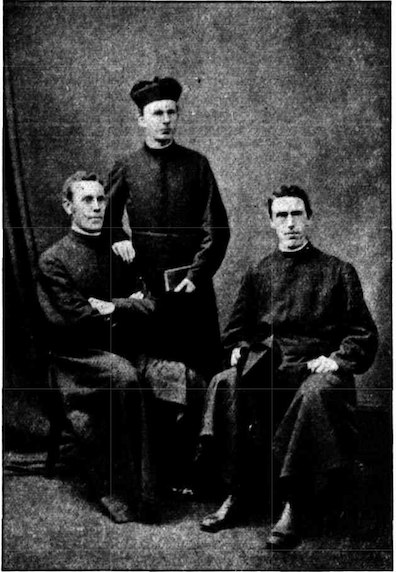The Congregation of Christian Brothers is a lay teaching
order founded by Waterford merchant Edmund Rice in 1802 to
promote the education of poor Catholic boys excluded by the
18th century penal laws. Although the name suggests a clerical
order of monks or friars, the Christian Brothers are laymen
who, in place of the monk's vows of chastity, poverty, and
obedience, take temporary vows of chastity, poverty, and
"perseverance." Public contributions have always supported
their schools, which keep rates low to make education
affordable. The order has built schools all over Ireland, as
well as many in England, Australia, India, and the Americas.
There are three in Dublin, including the establishments on
Synge Street and Westland Row that Flann O'Brien mocked
uproariously in The Hard Life. The school on North
Richmond Street is named for Daniel
O'Connell, who seems to have played a role in its
founding in 1828. Locally, it has long been called "the
working man's Belvedere."
The O'Connell School figures in Joyce's fictions because his
family lived nearby in the early 1890s and he briefly attended
it. Araby begins, "North Richmond Street, being blind,
was a quiet street except at the hour when the Christian
Brothers' School set the boys free." Wandering Rocks dramatizes
just such a scene: "Father Conmee turned the corner and walked
along the North Circular road. . . . A band of satchelled
schoolboys crossed from Richmond street. All raised untidy
caps. Father Conmee greeted them more than once benignly. Christian
brother boys." Joyce himself was one of those boys for
several months starting in January 1893, after he finished his
studies at Clongowes Wood
College.
John Conmee had been the rector at Clongowes, and he was now
Prefect of Studies at Belvedere. One day in early 1893 John
Joyce crossed paths with Conmee on Mountjoy
Square, told him about the boy who had made a favorable
impression on him at Clongowes, and asked him to admit James
to Belvedere College free of charges, as Belvedere did for
about a quarter of its students. Joyce included the event in A
Portrait:
—I walked bang into him,
said Mr Dedalus for the fourth time, just at the corner of the
square.
—Then, I suppose, said Mrs Dedalus,
he will be able to arrange it. I mean about Belvedere.
—Of course he will, said Mr Dedalus.
Don't I tell you he's provincial of the order now?
—I never liked the idea of sending
him to the christian brothers myself, says Mrs. Dedalus.
—Christian brothers be damned! said
Mr Dedalus. Is it with Paddy Stink and Micky Mud? No, let him
stick to the jesuits in God's name since he began with them.
They'll be of service to him in after years. Those are the
fellows that can get you a position.
—And they're a very rich order,
aren't they, Simon?
—Rather. They live well, I tell you.
You saw their table at Clongowes. Fed up, by God, like
gamecocks.
John Joyce's snobbishness about a Jesuit education, which
must have kept uneasy company with his indigence, communicated
itself to his son, whose fictions do not represent the fact
that he briefly endured the indignity of a Christian Brothers
education. Gordon Bowker's biography notes that he told
Herbert Gorman he had never attended their school (43).
Christian Brothers schools have long been known for harsh
rote learning enforced by harsh discipline. Their noble social
aims notwithstanding, lack of "obedience" to church
authorities or answerability to civic ones encouraged many of
them, especially industrial schools like the one at Artane, to
condone savage beatings of children (despite Rice's
forward-thinking prohibition of corporal punishment), and to
overlook rampant sexual abuse. Their reputation is now fatally
blackened, along with other Irish Catholic institutions like
orphanages and laundries, but the Christian Brothers were a
shaping force in Irish society for two centuries, offering
primary and secondary education to children who might not
otherwise have succeeded economically. Until the scandals
broke they ensured their continuing centrality in 20th century
culture by fostering several generations of nationalist
Catholic leaders.
The pandybat scene in part 1 of A Portrait shows
that even Jesuit schools were not free of cruel and unjust
punishments, and An Encounter suggests that the
public "National Schools," which mostly trained students for
the workplace, may have rivaled the Christian Brothers for
violent abuse. The boy who narrates the story is asked by a
strange man about his friend, "did he get whipped often at
school. I was going to reply indignantly that we were not National School boys to be
whipped, as he called it." The seductive opportunity
that sadists and pederasts discover in holding power over
young schoolboys is vividly evoked in the horrifying sentences
that follow, as the stranger begins "to speak on the subject
of chastising boys."



